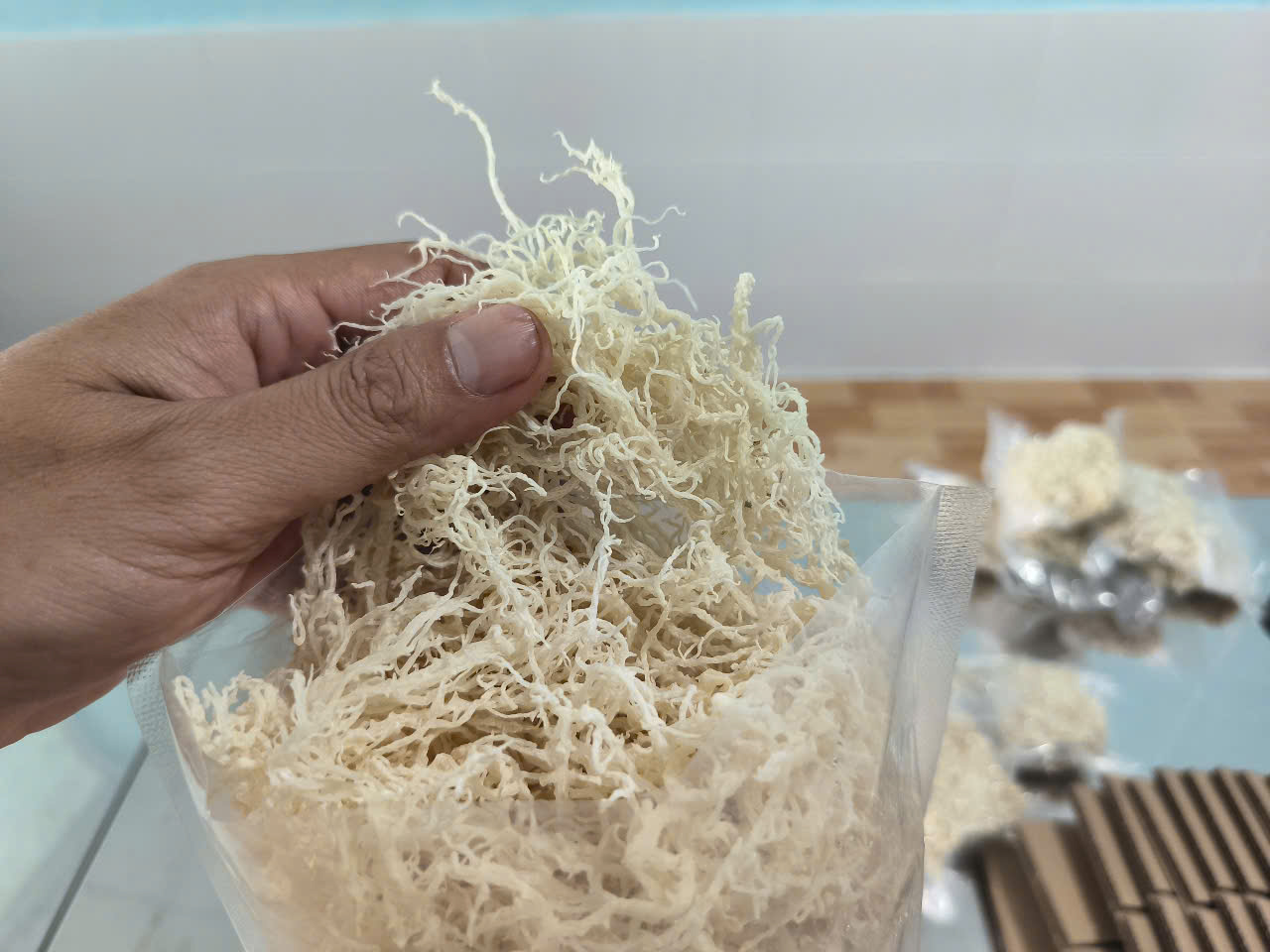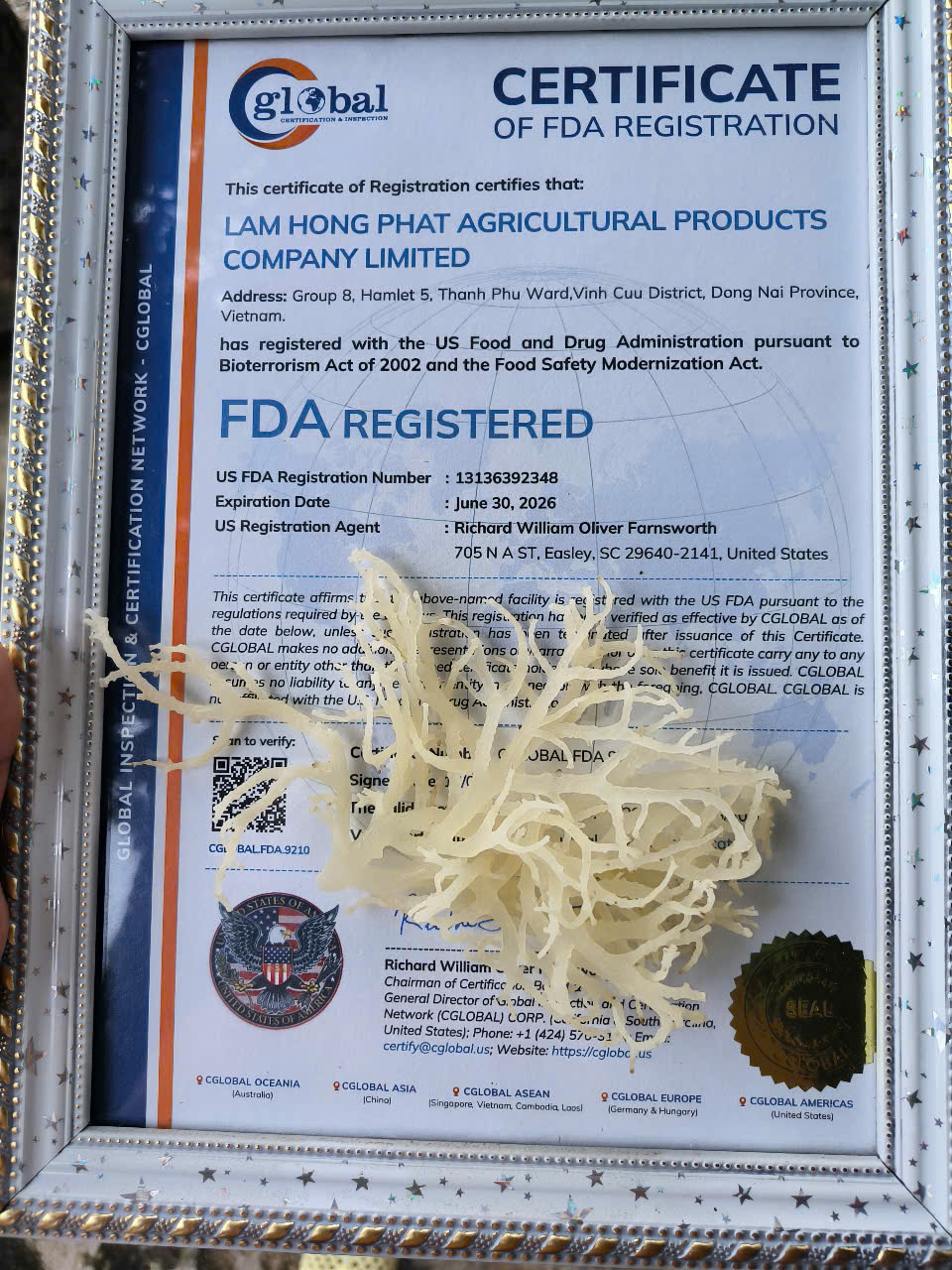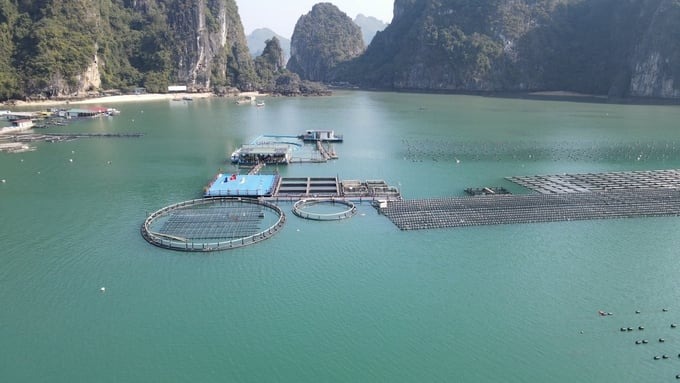Choosing a reputable cottonii seaweed supplier and establishing a long-term partnership is essential for businesses aiming to maintain a stable supply chain and consistent product quality. Therefore, selecting reliable cottonii exporters requires careful research and thorough evaluation before making a final decision.
If your business is currently seeking the right cottonii seaweed supplier - especially in the Southeast Asian market, with a focus on Vietnam, this guide provides valuable insights to help you make informed choices.
1. Key factors to help you choose a reliable cottonii seaweed supplier
1.1. Certification and traceability
Start by verifying that the prospective cottonii seaweed supplier holds internationally recognized certifications such as ISO 22000, HACCP, or organic certifications. These credentials demonstrate that the supplier adheres to rigorous quality management and safety protocols.
Reliable exporters should also offer full traceability, from farm GPS coordinates to harvest date and drying batch information. This ensures supply chain transparency and allows for swift responses in case of contamination or recalls.

Seaweed product by Lam Hong Sea Moss.
1.2. Proven export experience and global network
A dependable cottonii exporter should have a proven track record of international shipments, complete documentation (e.g., Phytosanitary Certificates, COAs), and familiarity with the regulatory requirements of key markets.
Look for partners who offer:
- Multi-port logistics
- Transparent lead times
- Reference clients in the U.S., EU, or Asia
Export experience helps avoid delays, documentation issues, and customs problems.
2. Manufacturer support from trusted cottonii seaweed companies
Beyond shipping and logistics, a trusted cottonii seaweed company offers technical and commercial backing. Expect services such as:
- Formulation assistance (gel-strength, nutrient content)
- On-site or third-party testing (heavy metals, microbial safety)
- Private-label packaging or custom processing (micronizing, sterilization)
Your supplier should proactively offer R&D samples, COAs, and nutritional data to ensure ingredient compliance and suitability.
2.1. Scalability and supply resilience
A global cottonii distributor must support your production needs over time, especially during supply chain disruptions due to weather, tariffs, or market demand. Key questions include:
- Can they scale from pilot batches to full production?
- Do they maintain buffer inventory or source from multisite farms?
- How do they control post-harvest drying and storage to prevent mold and moisture?
Scalable, climate-resilient infrastructure signals preparedness to support long-term brand growth.
2.2. Ethical, sustainable, and transparent sourcing
Sustainability is a growing priority. A reputable cottonii seaweed supplier transparently communicates:
- Farming methods (e.g., organic, regenerative aquaculture)
- Fair labor and community practices (e.g., cooperative models in Vietnam/Indonesia)
- Sustainability commitments, supported by third-party assessments or certifications
These attributes support your brand’s values and appeal to socially responsible consumers.

Product certification issued for Lam Hong Sea Moss
3. Price transparency and total cost of ownership
Comparing quotes requires more than just looking at the price per kilogram. Ask suppliers to break down:
- FOB or CIF costs
- Cost per functional unit (e.g., carrageenan yield, protein content)
- Customs, logistics, and warehousing
- Testing and quality assurance fees
Reliable cottonii seaweed suppliers offer clear, transparent pricing and show how bulk purchases can reduce your long-term costs.
Comparison table: Criteria for identifying a reliable cottonii seaweed supplier
|
Evaluation criteria |
Trusted cottonii seaweed supplier |
Unreliable supplier |
|
International certifications |
Holds ISO, HACCP, Organic, GMP, or equivalent certifications |
Unverified or no certifications |
|
Export experience |
Extensive export history, full documentation, regulatory compliant |
Limited experience, customs delays |
|
Traceability |
Full farm-to-factory traceability |
Vague or missing origin details |
|
Inventory & delivery |
Reliable stock, on-time delivery, supports large volume orders |
Irregular supply, frequent delays |
|
Technical support |
Offers formulation assistance, COA, lab testing, and safety screening |
No lab access or technical services |
|
Price transparency |
Detailed quotes, clear terms, cost-saving options |
Hidden costs, unclear pricing |
|
Reputation |
Trusted by major companies in EU/US/Asia, with positive market feedback |
No recognizable clients, lacks market presence |
|
Sustainability |
Employs eco-friendly farming, supports local communities |
No social or environmental policies |

Lam Hong Sea Moss seaweed cultivation farm
4. Cottonii seaweed suppliers in Southeast Asia
Southeast Asia is a major hub for cottonii farming thanks to its tropical climate, aquaculture expertise, and improving quality standards. Here’s a breakdown of top countries:
4.1. Vietnam – The emerging high-quality supplier
Key strengths:
- Consistent Product Quality: Vietnam is gaining recognition for its focus on clean processing, organic farming practices, and investments in post-harvest handling, especially in areas like Nha Trang and Phú Yên.
- Traceability & certifications: Many Vietnamese cottonii seaweed suppliers provide full documentation, including COA, MSDS, and increasingly meet ISO, GMP, or organic standards.
- Logistics advantage: Vietnam’s proximity to China and improved port infrastructure offers competitive shipping options to key markets such as the U.S., EU, and East Asia.
- Notable companies: Mid-sized companies like Lam Hong Sea Moss offer tailored B2B services and competitive pricing while maintaining traceable sourcing.
4.2. Indonesia – the largest volume exporter
Key Strengths:
- Mass production capacity: Indonesia is the world’s largest producer of cottonii, with farming communities spread across Sulawesi, Bali, and eastern islands.
- Diverse grades available: From industrial-grade to refined dried seaweed, the variety allows for both bulk buyers and value-added processing companies to choose based on their needs.
Challenges:
- Inconsistent quality: Some cottonii seaweed suppliers lack batch-to-batch consistency, and documentation or certification levels vary significantly.
- Limited transparency: Smaller producers may offer lower prices but lack traceability, posing risks for high-standard buyers.
4.3. Philippines – Trusted for organic and sustainable farming
Key strengths:
- Established industry practices: The Philippines has long-standing farming cooperatives and often collaborates with international NGOs and sustainability initiatives.
- Focus on certification: Many exporters offer Certified Organic cottonii and comply with EU and USDA organic standards.
Challenges:
- Smaller export volumes: Compared to Indonesia, volumes are more limited, which may not suit manufacturers with high-volume demands.
Summary table: Supplier comparison by country:
|
Criteria |
Vietnam |
Indonesia |
Philippines |
|
Production Volume |
Medium |
High |
Medium |
|
Certification level |
ISO, HACCP, Organic (growing) |
Varies widely |
Strong Organic focus (USDA, EU certified) |
|
Quality consistency |
High (with selected suppliers) |
Moderate (batch variance) |
High |
|
Logistics |
Strong (ports, shipping lanes) |
Strong |
Moderate |
|
Traceability & Transparency |
Strong (select exporters) |
Moderate to low |
Strong |
|
Sustainability Practices |
Emerging (eco-focused farms) |
Limited (farm-dependent) |
Advanced (via NGO backed programs) |
If you're looking for a reliable cottonii seaweed supplier in Southeast Asia, especially in Vietnam, consider reaching out to Lam Hong Sea Moss. While we may not be the largest exporter, we are confident in our ability to deliver:
- Consistent product quality
- Transparent and flexible terms
- Long-term support tailored to your brand’s needs
Let’s connect and explore how we can build a sustainable and productive partnership.






